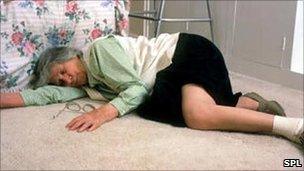NHS report calls for joined up plan to cut falls by elderly
- Published

A more joined-up strategy, driven at the local rather than national level, is needed to cut falls by the elderly, says an NHS Confederation report.
They warn that prevention needs to become a key priority as the elderly population grows.
The group says not enough is being done to stop people falling again after an initial incident.
The Department of Health said it was working hard to prevent falls and improve the treatment of them.
Injuries from falls are the leading cause of death in people over 75 in the UK.
Integrated approach
Jo Webber, representing ambulance services in the NHS Confederation, said: "Half the people in this country over 80 will suffer a fall this year.
"Falls are not only physically debilitating but, particularly for older people, they really knock their confidence and can slow recovery.
"We have to take the opportunity of the NHS reforms to get organisations across health, social care and local authorities working together.
"Effective falls services that are already up and running across the country show that for little initial investment, patients are getting better care, more falls are being prevented and money is being saved."
The NHS Confederation, a group that represents NHS managers in England, believes that government policies for the last 20 years have not been entirely successful, with many patients experiencing disjointed care.
They recommend that local government, the NHS and social care services work more closely together and suggest using a patient's NHS number as a way for tracking and assessment.
'Unacceptable' care
It has been estimated by the Department of Health that such a fall prevention strategy could cut falls by 30%.
A Department of Health spokesman said: "The coalition government realises the devastating effects that falls can have on people's health, and the contribution that falls make to the level of hospital admissions and costs.
"We know that (treatment is) most effective when social care and the NHS work together, and we are putting in place the legal conditions and financial incentives to drive greater integration."
Michelle Mitchell, from the charity Age UK said: "We warmly welcome this briefing and urge local organisations to implement the recommendations.
"The quality of falls prevention services vary a great deal from place to place - and this is unacceptable. We should have effective services in all areas to support people who have fallen and prevent it from happening again.
"We know that by investing in specialist services that help older people to avoid falling and breaking bones, we can save the health service money."